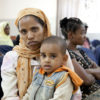Using Retained Revenue to Make Quality Improvements at Felege Hiwot Referral Hospital
Announcements, Where We WorkThe Health Sector Financing Reform (HSFR)/HFG project has supported the Ethiopian government to implement a wide range of health care financing reforms. One such reform allows hospitals and health centers to retain revenue collected from patient fees to make quality improvements. In this short video, personnel at Felege Hiwot Referral Hospital located in Bahir Dar, […]





